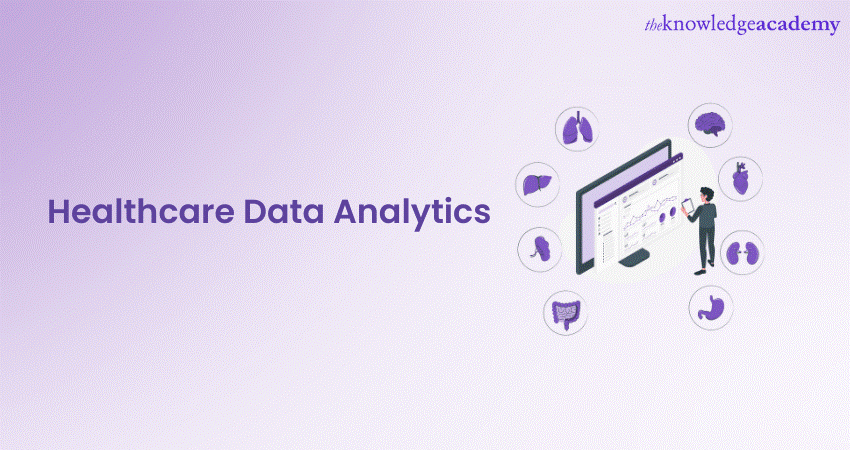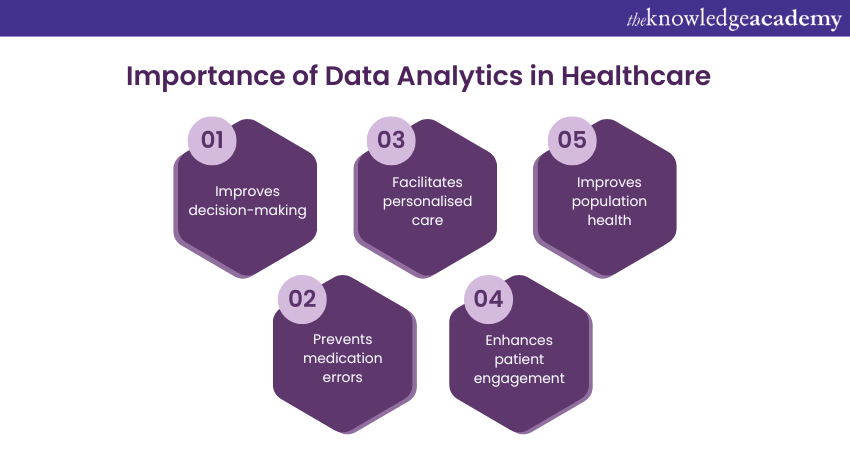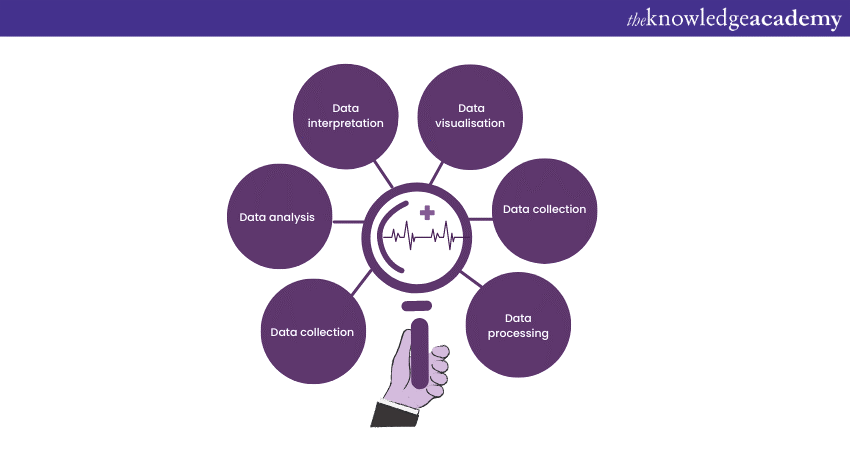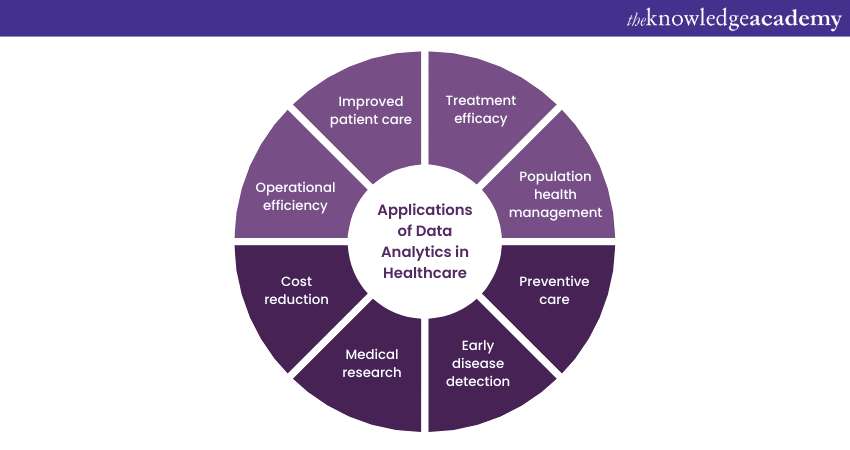We may not have the course you’re looking for. If you enquire or give us a call on +33 805638382 and speak to our training experts, we may still be able to help with your training requirements.
Training Outcomes Within Your Budget!
We ensure quality, budget-alignment, and timely delivery by our expert instructors.

In a world where healthcare is rapidly evolving, data emerges as the cornerstone of innovation and progress. But what lies at the heart of this transformative journey? Enter Healthcare Data Analytics, a dynamic field brimming with potential to revolutionise patient care, operational efficiency, and strategic decision-making.
Healthcare Data Analytics, exemplified in combatting COVID-19, analyses infection rates, hospital admissions, and vaccination data to predict hotspots, guide policies, and allocate resources effectively. This approach informs vaccination strategies, guides public health policies, and saves lives amidst the pandemic. Let’s dive in!
Table of Contents
1) What is Healthcare Data Analytics?
2) Importance of Data Analytics in Healthcare
3) Who uses Data Analytics in healthcare?
4) How Does Healthcare Data Analytics Work?
5) Ways to Use Data Analytics in Healthcare
6) Challenges of Big Data in healthcare and how to overcome them
7) Conclusion
What is Healthcare Data Analytics?
Healthcare Data Analytics uses Statistical Analysis and Machine Learning approaches to break down large amounts of health-related data. It looks for patterns, trends, and correlations in medical records, genetic databases, and mobile devices to improve patient outcomes, cost-effectiveness, and clinical decision-making.
Medical professionals obtain useful knowledge from data collection, processing, and interpretation, which improves specific treatment, prevents pharmaceutical errors, and predicts public health risks. These insights help simplify administrative operations, encourage medical research, and improve risk management.
Importance of Data Analytics in Healthcare
Data Analytics is becoming really important in healthcare. It helps doctors and hospitals make better choices by looking at lots of health information. Here are some ways it helps:

1) Making better decisions: Data Analytics gives doctors useful information to help them make choices that are good for patients and make hospitals run better.
2) Personalised care: It helps doctors give treatments that are just right for each patient by looking at their individual information.
3) Avoiding mistakes with medicine: By checking patient records, Data Analytics can help stop dangerous errors with medicines.
4) Making patients happier: By listening to what patients say and checking how they're doing, doctors can improve their care and make patients feel better.
5) Keeping people healthy: By looking at lots of data, doctors can spot health problems early and make rules to keep everyone safer and healthier.
6) Strengthens health information exchange: Data Analytics aids in the effective and secure exchange of health information, improving coordination of care and patient outcomes.
7) Enables predictive analysis: Data Analytics helps doctors predict what might happen with patients' health, outbreaks of diseases, and trends in healthcare.
8) Boosts medical research: It helps scientists learn faster about patterns in health and find new treatments.
9) Streamlines administrative processes: Data Analytics finds problems in how things are done in hospitals and shows ways to make them better, saving time and money.
10) Identifies training needs: By analysing performance data, Healthcare providers can identify areas where further training or development is needed.
11) Monitors patient adherence: Data Analytics can track patient adherence to medication regimes and lifestyle changes, aiding in improved patient management.
12) Improves quality of care: Through the analysis of patient outcomes and satisfaction data, Healthcare providers can notify the areas for improvement and develop strategies to enhance the quality of care.
13) Supports risk management: By identifying potential risks and vulnerabilities, Data Analytics supports risk management in the Healthcare settings.
14) Aids in resource allocation: Data Analytics can help predict future demand for services and assist in the effective allocation of resources.
Gain an in-depth understanding of Big Data with our comprehensive guide on Big Data Analysis Training.
Who uses Data Analytics in healthcare?
Health-related Data Analysts, physicians, researchers, administrators, and policymakers are among the many of the healthcare professionals who use Data Analysis to accomplish a range of goals in the field:
Health Data Analysts: Health Data Analysts use it to improve patients' experiences and help doctors make decisions. For example, they track how diseases are going, find people at high risk, and see if treatments work.
Researchers: Researchers look at how diseases are spreading, find out why some people are more likely to get sick, and try to find new treatments.
Administrators: Use Data Analytics to maximise the number of employees, manage expenses, and enhance operations.
Policymakers: Use Data Analytics to guide resource allocation, develop rules and regulations, and healthcare policies.
How does Healthcare Data Analytics work?
Healthcare Data Analytics plays a pivotal role in enhancing patient care, managing costs, predicting outbreaks, and driving strategic decision-making. So, if you want to understand the stages that lead to an efficient model of Healthcare using Data Analytics, these will help you out:

a) Data collection: Data collection in healthcare can be complex due to the variety of sources which includes electronic health records, medical devices, wearable technology, and patient surveys, to name a few. The first step involves gathering this diverse set of data in a systematic way.
b) Data processing: Once the data is collected, it's time to process it. This involves structuring the data into a useful and manageable format, which can then be stored in databases or data warehouses. With the progressing use of electronic health records, data processing has become more streamlined in the Healthcare sector.
c) Data cleaning: Data quality is critical in the Healthcare industry as the stakes are high. Errors, duplicates, or inconsistent data can lead to wrong diagnoses or treatments. Hence, data cleaning is an essential step, which involves checking for errors, fixing them, and ensuring the overall quality and reliability of the data.
d) Data Analysis: In this stage, statistical tools and algorithms are used to uncover patterns, trends, and insights from the collected data. This could mean identifying risk factors for a disease, predicting patient outcomes, or understanding the effectiveness of a treatment.
e) Data interpretation: Interpreting the results accurately is crucial in Healthcare Data Analytics. Clinicians, Data Scientists, and Healthcare Administrators work together to make sense of the analysed data and derive meaningful, actionable insights.
f) Data Visualisation: Visualising data helps in better understanding of the insights and facilitates communication among Healthcare professionals. This could be in the form of graphs, charts, dashboards, or even sophisticated interactive visualisations.
Now you know what goes on to create tailored, and personalised results behind each patient, to make the Healthcare industry more accessible and cost effective.
Attain specialisation in Data Analytics with our Advanced Data Analytics Certification.
Ways to use Data Analytics in Healthcare
Since we have established the pros of using Healthcare Data Analytics, we’ll show you how it can be used to improve the Healthcare system. Here's how:

a) Improved patient care: By analysing patient data, Healthcare providers can create personalised treatment plans that cater to the unique needs of each patient. Predictive analytics can also identify high-risk patients and provide preventative measures to reduce readmissions.
b) Operational efficiency: Data Analytics can help Healthcare facilities become more efficient by providing insights into operations, helping identify bottlenecks, and suggesting areas for improvement.
c) Cost reduction: By identifying inefficiencies and predicting future trends, Data Analytics can help hospitals and clinics cut down on unnecessary costs.
d) Medical research: Data Analytics plays a pivotal role in clinical trials and research. It helps in understanding patterns, verifying hypotheses, and interpreting complex biological data.
e) Early disease detection: Predictive analytics can examine patient data to identify early signs of diseases, even before the patient experiences any symptoms.
f) Preventive care: By analysing lifestyle data along with medical records, Data Analytics can recommend preventive measures to keep diseases at bay.
g) Population health management: Data Analytics can help in understanding health trends at a population level, aiding in effective disease management and policy-making.
h) Treatment efficacy: By comparing patient data before and after a treatment, Data Analytics can help in determining the effectiveness of different treatment options.
i) Reduced fraud: Analytics can be used to detect anomalies or irregularities in billing, reducing instances of fraud and overbilling.
j) Drug development: In pharmaceutical research, Data Analytics can accelerate drug development by making sense of complex experimental data.
k) Telemedicine: With the rise of telemedicine, Healthcare Data Analytics can help in providing remote patient monitoring and effective virtual care.
l) Resource allocation: Data Analytics can guide decision-makers in effective allocation of resources by predicting future demand.
m) Patient satisfaction: By analysing patient feedback and correlating it with other factors, Data Analytics can help improve patient satisfaction levels.
n) Health risk alert: Data Analytics can send alerts about potential health risks based on the analysis of real-time data.
o) Genomics and personalised medicine: By analysing genetic data, Healthcare providers can offer more personalised treatments, marking a significant stride towards personalised medicine.
Challenges of Big Data in healthcare and how to overcome them
The following are some of the most significant problems the healthcare sector is dealing with, along with the actions performed to deal with them:
Poor data quality
When it comes to health care insights, high-quality data is important, but healthcare data is frequently missing, inaccurate, and kept in several forms across numerous systems and departments. Problems with data quality can have an effect on the reliability and precision of analytics outputs, which can result in incorrect conclusions, incorrect guidance, and poor decision-making.
However, there are several methods that can be used to get around the problem of low-quality data. For example, carrying out regular information audits could identify mistakes in the data and allow immediate corrections. Artificial intelligence and Machine Learning can also find patterns and trends much more quickly than human analysis, which saves both time and money.
Data privacy and security
Data protection from theft, unauthorised access, and breaches is essential since healthcare data contains sensitive and private information. Improved data security can be promoted by organisations through:
a) Ensuring compliance to confidentiality regulations by companies, such the GDPR.
b) Employee training on security and privacy procedures.
c) Conducting regular risk assessments to detect potential vulnerabilities in patient information.
Integration with existing systems and adoption issues
Since healthcare data is typically dispersed over several systems, integrating and analysing data from various sources can be challenging.
Healthcare organisations may find it difficult and time-consuming to adopt new Data Analytics tools and methods for a variety of reasons, including:
a) Opposition to change
b) Understanding of the advantages of Data Analytics
c) A belief that carrying out will be expensive
Lack of analytical expertise
Healthcare Data Analytics requires a high level of expertise. The shortage of skilled Data Analysts who understand healthcare processes and data sources is a significant challenge and requires specific upskilling in Data Analysis. But sufficient skills can be taught through appropriate training, such as government-funded Data Analysis apprenticeships.
Enhance your skills with our comprehensive Big Data Architecture Training!
Conclusion
Healthcare Data Analytics stands at the forefront of transforming healthcare delivery. Its diverse applications, from improving patient care to optimising resource allocation, promise to revolutionise the industry. By harnessing the power of data, healthcare professionals can drive innovation, efficiency, and ultimately, better outcomes for patients.
Complete your understanding of Data Visualisation with our comprehensive guide on Data Science Analytics.
Frequently Asked Questions

Healthcare Data Analytics enables personalised treatment plans and identifies trends in patient health. This leads to early interventions and better-informed decision-making, ultimately improving patient outcomes.

Healthcare Data Analytics identifies inefficiencies and optimises resource allocation. It also predicts high-cost areas, enabling targeted interventions and cost-saving strategies, ultimately reducing healthcare expenses.

The Knowledge Academy takes global learning to new heights, offering over 30,000 online courses across 490+ locations in 220 countries. This expansive reach ensures accessibility and convenience for learners worldwide.
Alongside our diverse Online Course Catalogue, encompassing 17 major categories, we go the extra mile by providing a plethora of free educational Online Resources like News updates, Blogs, videos, webinars, and interview questions. Tailoring learning experiences further, professionals can maximise value with customisable Course Bundles of TKA.

The Knowledge Academy’s Knowledge Pass, a prepaid voucher, adds another layer of flexibility, allowing course bookings over a 12-month period. Join us on a journey where education knows no bounds.

The Knowledge Academy offers various Big Data and Analytics Training, including Big Data Analytics & Data Science Integration Course, Big Data Analysis and Big Data Architecture Training. These courses cater to different skill levels, providing comprehensive insights into Data Cleaning.
Our Data, Analytics & AI Blogs cover a range of topics related to Data Analytics, offering valuable resources, best practices, and industry insights. Whether you are a beginner or looking to advance your Data Analysis skills, The Knowledge Academy's diverse courses and informative blogs have you covered.
Upcoming Data, Analytics & AI Resources Batches & Dates
Date
 Hadoop Big Data Certification
Hadoop Big Data Certification
Thu 12th Sep 2024
Thu 12th Dec 2024







 Top Rated Course
Top Rated Course



 If you wish to make any changes to your course, please
If you wish to make any changes to your course, please


